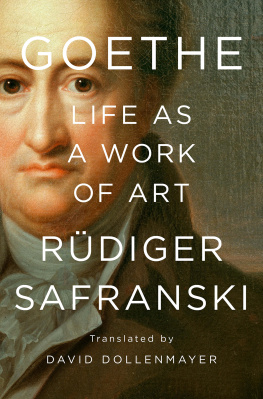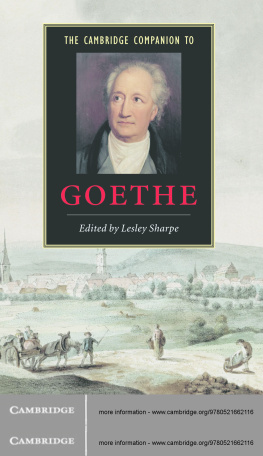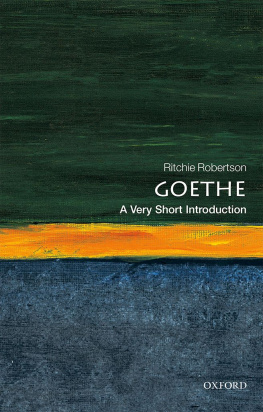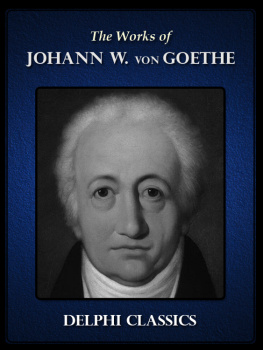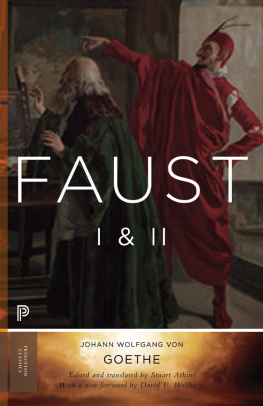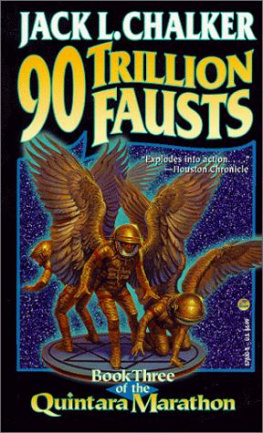Faust
Johann Wolfgang von Goethe
Again ye come, ye hovering Forms! I find ye, As early to my clouded sight ye shone! Shall I attempt, this once, to seize and bind ye? Still o'er my heart is that illusion thrown? Ye crowd more near! Then, be the reign assigned ye, And sway me from your misty, shadowy zone! My bosom thrills, with youthful passion shaken, From magic airs that round your march awaken.
Of joyous days ye bring the blissful vision; The dear, familiar phantoms rise again, And, like an old and halfextinct tradition, First Love returns, with Friendship in his train. Renewed is Pain: with mournful repetition Life tracks his devious, labyrinthine chain, And names the Good, whose cheating fortune tore them From happy hours, and left me to deplore them.
They hear no longer these succeeding measures, The souls, to whom my earliest songs I sang:
Dispersed the friendly troop, with all its pleasures, And still, alas! the echoes first that rang! I bring the unknown multitude my treasures; Their very plaudits give my heart a pang, And those beside, whose joy my Song so flattered, If still they live, wide through the world are scattered.
And grasps me now a longunwonted yearning For that serene and solemn SpiritLand: My song, to faint Aeolian murmurs turning, Sways like a harpstring by the breezes fanned. I thrill and tremble; tear on tear is burning, And the stern heart is tenderly unmanned. What I possess, I see far distant lying, And what I lost, grows real and undying.
It is twenty years since I first determined to attempt the translation of Faust, in the original metres. At that time, although more than a score of English translations of the First Part, and three or four of the Second Part, were in existence, the experiment had not yet been made. The prose version of Hayward seemed to have been accepted as the standard, in default of anything more satisfactory: the English critics, generally sustaining the translator in his views concerning the secondary importance of form in Poetry, practically discouraged any further attempt; and no one, familiar with rhythmical expression through the needs of his own nature, had devoted the necessary love and patience to an adequate reproduction of the great work of Goethe's life.
Mr. Brooks was the first to undertake the task, and the publication of his translation of the First Part (in 1856) induced me, for a time, to give up my own design. No previous English version exhibited such abnegation of the translator's own tastes and habits of thought, such reverent desire to present the original in its purest form. The care and conscience with which the work had been performed were so apparent, that I now state with reluctance what then seemed to me to be its only deficiencies,a lack of the lyrical fire and fluency of the original in some passages, and an occasional lowering of the tone through the use of words which are literal, but not equivalent. The plan of translation adopted by Mr. Brooks was so entirely my own, that when further residence in Germany and a more careful study of both parts of Faust had satisfied me that the field was still open,that the means furnished by the poetical affinity of the two languages had not yet been exhausted,nothing remained for me but to follow him in all essential particulars. His example confirmed me in the belief that there were few difficulties in the way of a nearly literal yet thoroughly rhythmical version of Faust, which might not be overcome by loving labor. A comparison of seventeen English translations, in the arbitrary metres adopted by the translators, sufficiently showed the danger of allowing license in this respect: the white light of Goethe's thought was thereby passed through the tinted glass of other minds, and assumed the coloring of each. Moreover, the plea of selecting different metres in the hope of producing a similar effect is unreasonable, where the identical metres are possible.
The value of form, in a poetical work, is the first question to be considered. No poet ever understood this question more thoroughly than Goethe himself, or expressed a more positive opinion in regard to it. The alternative modes of translation which he presents (reported by Riemer, quoted by Mrs. Austin, in her "Characteristics of Goethe," and accepted by Mr. Hayward),
"The rhythm," said Goethe, "is an unconscious result of the poetic mood. If one should stop to consider it mechanically, when about to write a poem, one would become bewildered and accomplish nothing of real poetical value."Ibid.
"All that is poetic in character should be rythmically treated! Such is my conviction; and if even a sort of poetic prose should be gradually introduced, it would only show that the distinction between prose and poetry had been completely lost sight of."Goethe to Schiller, 1797.
Tycho Mommsen, in his excellent essay, Die Kunst des Deutschen Uebersetzers aus neueren Sprachen, goes so far as to say: "The metrical or rhymed modelling of a poetical work is so essentially the germ of its being, that, rather than by giving it up, we might hope to construct a similar work of art before the eyes of our countrymen, by giving up or changing the substance. The immeasurable result which has followed works wherein the form has been retainedsuch as the Homer of Voss, and the Shakespeare of Tieck and Schlegelis an incontrovertible evidence of the vitality of the endeavor."
The various theories of translation from the Greek and Latin poets have been admirably stated by Dryden in his Preface to the "Translations from Ovid's Epistles," and I do not wish to continue the endless discussion,especially as our literature needs examples, not opinions. A recent expression, however, carries with it so much authority, that I feel bound to present some considerations which the accomplished scholar seems to have overlooked. Mr. Lewes
"Kommt, wie der Wind kommt,
Wenn Wlder erzittern Kommt,
wie die Brandung
Wenn Flotten zersplittern!
Schnell heran, schnell herab,
Schneller kommt Al'e!
Huptling und Bub' und Knapp,
Herr und Vasalle!"
or Strodtmann thus reproduce Tennyson:
"Es fllt der Strahl
auf Burg und Thal,
Und schneeige Gipfel,
reich an Sagen;
Viel' Lichter wehn auf blauen Seen,
Bergab die Wasserstrze jagen!
Blas, Hfthorn, blas, in Wiederhall erschallend:
Blas, Hornantwortet, Echos, hallend, hallend, hallend!"
it must be a dull ear which would be satisfied with the omission of rhythm and rhyme.
I have a more serious objection, however, to urge against Mr. Hayward's prose translation. Where all the restraints of verse are flung aside, we should expect, at least, as accurate a reproduction of the sense, spirit, and tone of the original, as the genius of our language will permit. So far from having given us such a reproduction, Mr. Hayward not only occasionally mistakes the exact meaning of the German text,
For there are few things which may not be said, in English, in a twofold manner,one poetic, and the other prosaic. In German, equally, a word which in ordinary use has a bare prosaic character may receive a fairer and finer quality from its place in verse. The prose translator should certainly be able to feel the manifestation of this law in both languages, and should so choose his words as to meet their reciprocal requirements. A man, however, who is not keenly sensible to the power and beauty and value of rhythm, is likely to overlook these delicate yet most necessary distinctions. The author's thought is stripped of a last grace in passing through his mind, and frequently presents very much the same resemblance to the original as an unhewn shaft to the fluted column. Mr. Hayward unconsciously illustrates his lack of a refined appreciation of verse, "in giving," as he says, "



